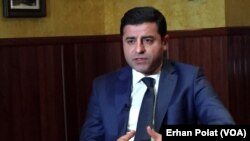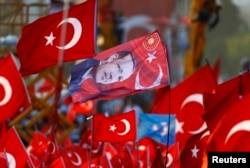A crackdown on Turkey's main Kurdish party, HDP, is intensifying as the country heads to elections. The crackdown comes as Kurds — a fifth of the electorate — are increasingly seen as key to the outcome of the June 24 general and presidential elections.
Selahattin Demirtas, the former HDP leader and the party's presidential candidate, appeared in court Monday on terrorist propaganda charges. The hearing was adjourned to June 8. If convicted, Demirtas will be barred from the presidential election.
Demirtas is widely seen as successfully bringing the HDP into the political mainstream and making it the second-largest parliamentary opposition party. Under emergency powers introduced after the 2016 failed coup, the former HDP leader has been jailed for over a year as part of a nationwide crackdown against his party.
On Saturday, nearly 40 HDP members in Istanbul were arrested at an election meeting, including many local officials.
According to the HDP, over 10,000 of its members are in jail, along with nine parliamentary deputies and nearly 100 elected mayors. The government accuses the HDP of having links to the outlawed Kurdish insurgent group PKK, a charge the party denies.
The HDP claims the crackdown stems from the political threat the party poses to President Recep Tayyip Erdogan.
"Support among [the] Kurds for Erdogan is in decline. This is why Erdogan is trying to crush HDP, to annihilate the Kurdish civic society, to crack down on Kurdish dissent," according to Ertugrul Kurkcu, HDP president and parliamentary deputy.
The Kurdish vote, which could change the outcome of a close election, previously was split evenly between the HDP and Erdogan's AKP, according to analysts.
In the June 2015 election under the charismatic leadership of Demirtas, the HDP made history, becoming the first pro-Kurdish party to successfully pass the 10 percent electoral voting threshold to enter parliament. That success robbed the ruling AKP of its majority.
Erdogan's AKP restored its majority five months later by courting Turkish nationalist voters and by launching an unprecedented military offensive against the PKK and legally cracking down on the HDP.
Action in Syria
Legal and military operations continue to intensify, with Turkish forces earlier this year entering Syria against the Syrian Kurdish militia.
Several pro-Kurdish cultural reforms introduced by Erdogan in his early years in power have been reversed recently. For example, Kurdish-language signs have been removed. In the meantime, several towns and city centers have been reduced to rubble fighting insurgents, creating hundreds of thousands of refugees.
Analysts suggest the electoral strategy could backfire.
"Atrocities, plundering and ethnic cleansing [in Syria], they are only allegations, but apparently they resonate among Kurdish voters," said political analyst Atilla Yesilada of Global Source Partners. "According to the polls, AKP is gaining among nationalists but losing among Kurdish voters."
Undaunted, Erdogan's AKP has made a formal electoral alliance with the pro-nationalist MHP party, after passing special legislation to legally sanction such alliances. The MHP is traditionally strongly opposed to any Kurdish cultural reforms and is calling for an intensification of military operations against the PKK.
Observers point out that the AKP-MHP alliance can only add to unease among AKP Kurdish votes.
"The destruction of five or six Kurdish towns, although it was against the PKK and others, still Erdogan's Kurdish voters weren't happy with this," political scientist Cengiz Aktar said. "There is general unease among the traditionalist or conservative Kurds who vote Erdogan. How it will translate into anti-Erdogan votes remains to be seen. There are not many pro-Erdogan Kurds ready to vote HDP."
Alternatives
Analysts suggest Erdogan could be calculating that as in previous elections, no alternative party for religious Kurds will emerge. But the pro-Islamic Kurdish Huda Pa Party, traditionally a strong Erdogan supporter, has openly criticized the president over the crackdown. Huda Pa successfully challenged an attempt by the electoral board to exclude it from the polls.
While the Islamist Saadet Party is also actively courting Kurdish voters, both parties are small and unlikely to pass the 10 percent electoral threshold. But under new legislation, the door is open to electoral alliances with a larger party. The prime candidate for such an alliance is the newly formed IYI Party, which too has been courting religious Kurdish voters.
With Turkey remaining under emergency rule, questions remain over voter fraud. Last April's referendum was marred by vote-stuffing allegations, and many of those claims came from Turkey's predominantly Kurdish region. Much of the region is under strict military control as fighting continues against the PKK.
All opposition party leaders have prioritized voter security in what is increasingly being predicted to be a closely fought campaign. Analysts warn Erdogan is facing for the first time a complex electoral map, with rivals on both the right and left of the political spectrum, and the Kurdish vote likely to hold the key to the outcome.






